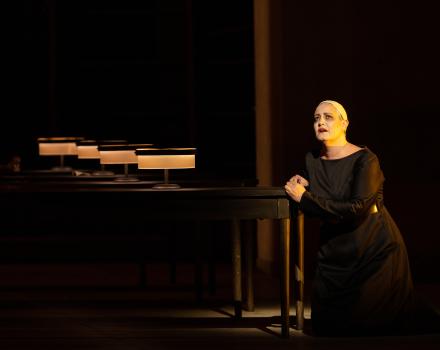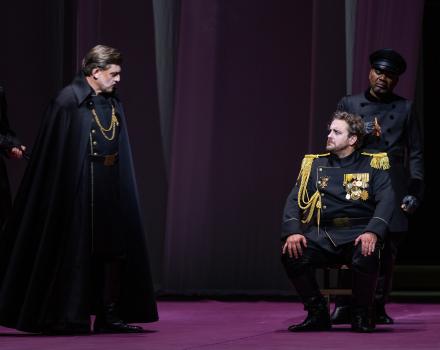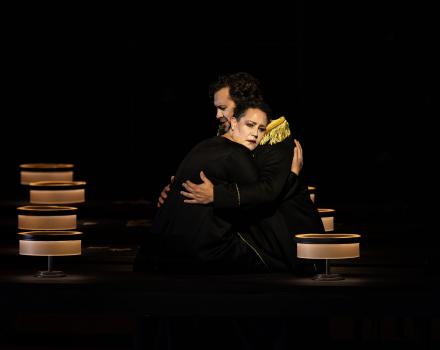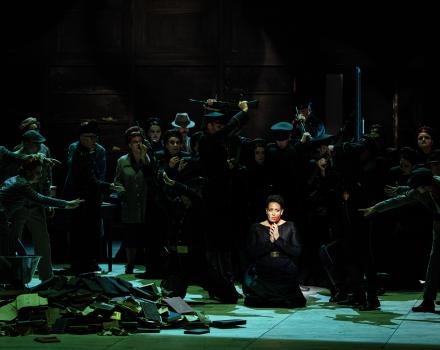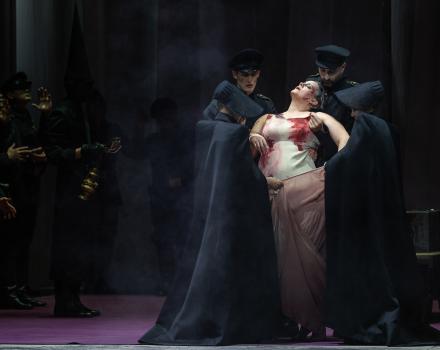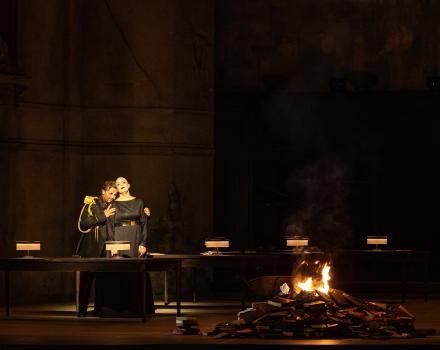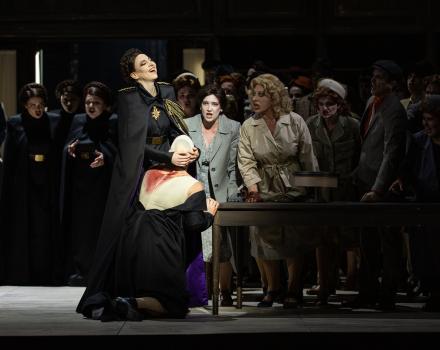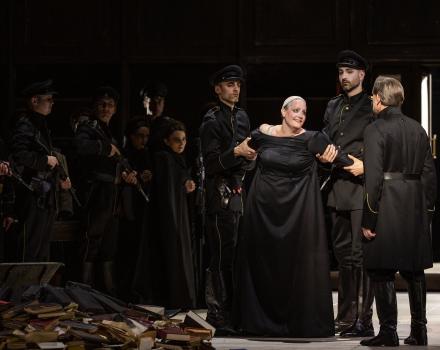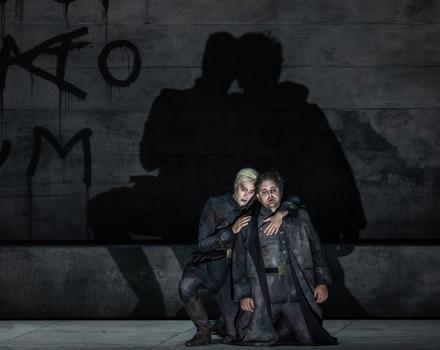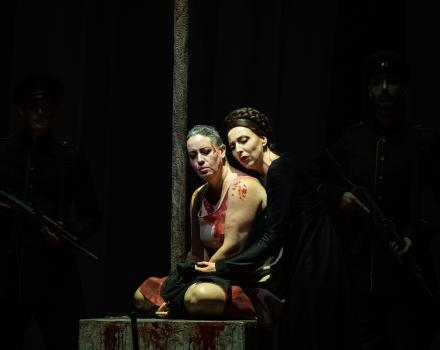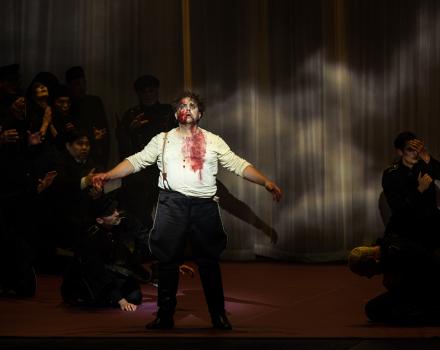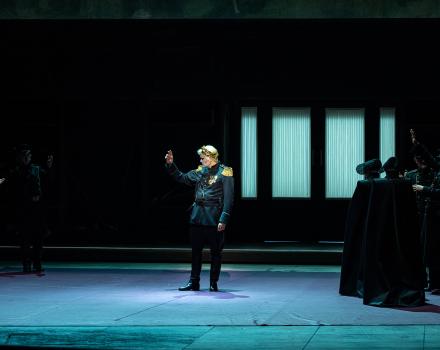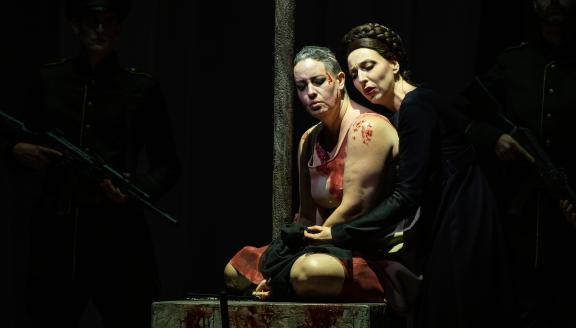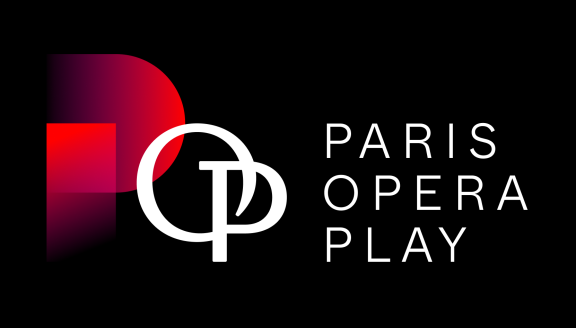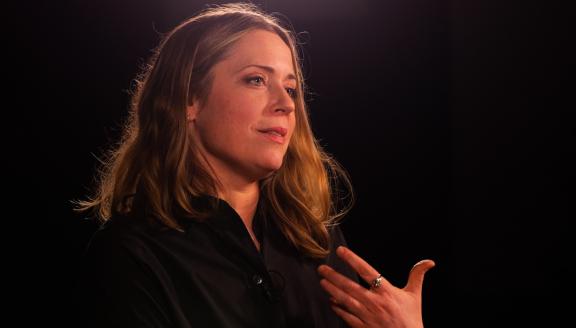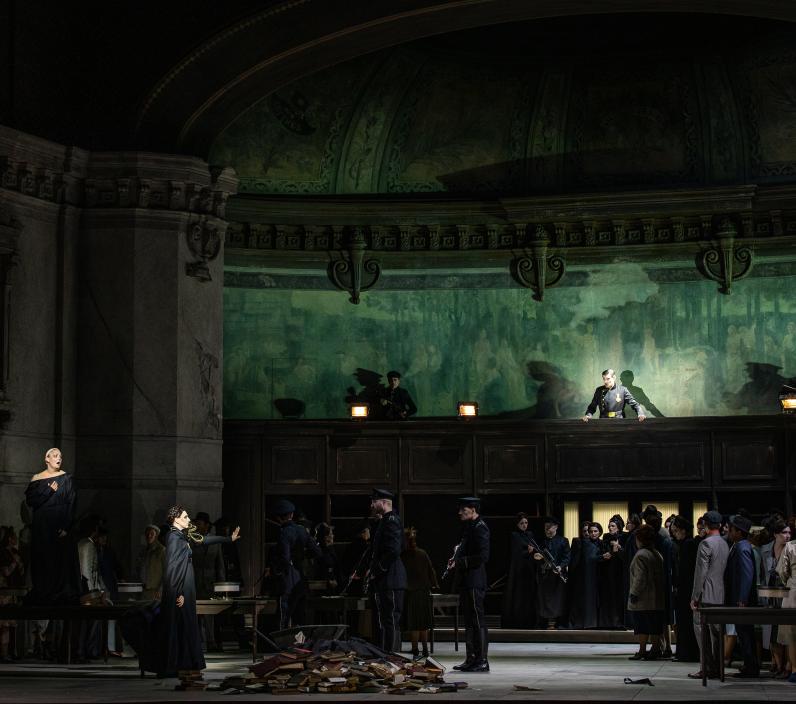
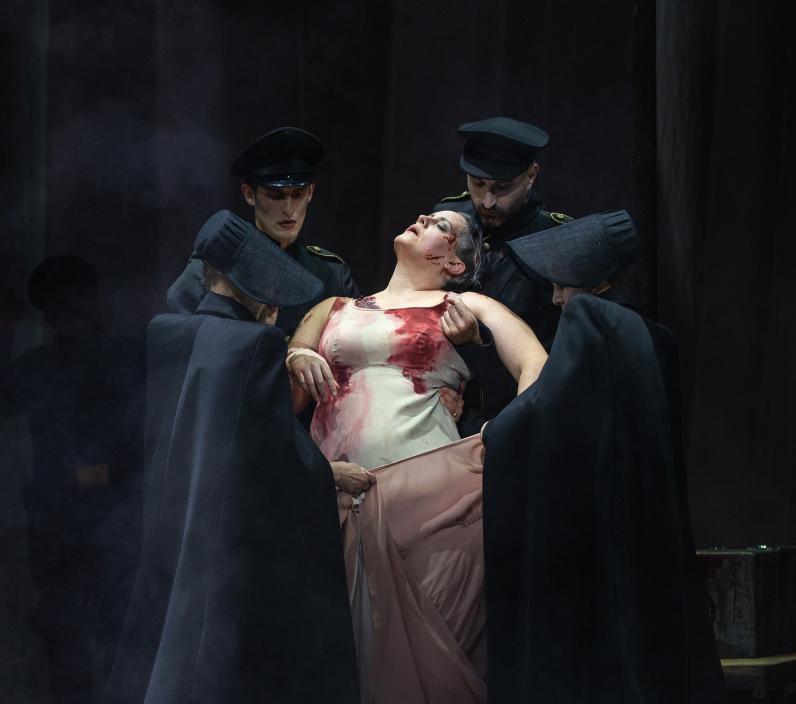
La Vestale

Priestess Julia watches over the eternal flame of the goddess Vesta. While the Great Vestal condemns to death every virgin who breaks her vow of chastity, Julia is delighted to be reunited with Licinius, who has returned from war as a victorious Roman general. One night, as the two lovers swear their love before the temple altar, the eternal flame goes out…
Opéra national de Paris makes its OperaVision debut with Gaspare Spontini's La Vestale, a rarely performed opera that was triumphantly received when it premiered on this very stage in 1807. Stage director Lydia Steier explores the themes of religious extremism and militaristic zeal: can love have any hope of surviving between these two ruthless extremes? Conductor Bertrand de Billy leads the Orchestra of the Paris Opera and a first-rate cast, including Elza van den Heever as Julia, Michael Spyres as her beloved Licinius, and Eve-Maud Hubeaux as the Grande Vestale.
Cast
Julia | Elza van den Heever |
|---|---|
Licinius | Michael Spyres |
The Great Vestal | Ève‑Maud Hubeaux |
Cinna | Julien Behr |
The High Priest | Jean Teitgen |
The Chief of the Aruspices, a consul | Florent Mbia |
Chorus | Opéra national de Paris Chorus |
Orchestra | Opéra national de Paris Orchestra |
| ... | |
Music | Gaspare Spontini |
|---|---|
Text | Étienne de Jouy |
Conductor | Bertrand de Billy |
Director | Lydia Steier |
Sets | Etienne Pluss |
Costumes | Katharina Schlipf |
Lights | Valerio Tiberi |
Video | Etienne Guiol |
Dramaturgy | Olaf A. Schmitt |
Chorus Master | Ching-Lien Wu |
| ... | |
Story
Act 1
Licinius has returned home from the war as a victorious Roman general. He encounters Cinna who wants to know why he is so sad. Licinius confesses that he is in love with Julia and that five years previously he was unable to prove to her father that he was worthy of her. It was to improve his standing that he joined the army. After his return he learned that Julia was forced to promise her father on his deathbed that she would become a Vestal Virgin and to preserve her chastity. Cinna agrees to help Licinius and the two men reaffirm their friendship.
The Vestal Virgins sing to their goddess and the eternal flame that they guard in the temple. The Great Vestal condemns to death every virgin who breaks her vow of chastity. To celebrate Rome’s victory in the war she announces a triumphal procession. Julia is given the task of crowning Licinius with the “wreath of immortality”. Left alone, Julia is torn between her joy at seeing Licinius again and her fear of the consequences of her forbidden love.
During the festivities, the Great Vestal chooses Julia to guard the eternal flame in the coming night. Licinius hears about this and tells Julia of his plan to abduct her from the temple. A consul, the High Priest and the entire population celebrate the triumphant warrior.
Act 2
At night in the temple, Julia begs Vesta for mercy. She wishes to see Licinius one more time and then surrender herself to the gods’ vengeance. In front of the altar, Licinius and Julia swear their love in a fever of passion. The eternal flame goes out. Cinna enters the temple and tries to persuade Licinius to flee. But Licinius refuses to comply with either Cinna’s or Julia’s urgings to leave.
When voices are heard from outside, Licinius and Cinna depart. The people and the other Vestal Virgins swarm into the temple and condemn the crime that has been committed. The High Priest demands from Julia the name of the intruder, but she refuses to reveal it. He curses her and sentences her to death.
Act 3
Cinna tells Licinius that he has put together a troop of legionnaires to assist him. Licinius tries unsuccessfully to persuade the High Priest to overturn the death sentence and confesses that he is Julia’s lover. The Chief of the Aruspices points out the gathering soldiers to the High Priest and recommends delaying the sacrifice. However, the High Priest rejects this idea. Before the death sentence is carried out, he has Julia’s veil placed on Vesta’s altar. If the veil catches fire it will mean that Vesta forgives her priestess. Licinius publicly admits that he is the guilty party and demands that Julia’s life be spared. But Julia pretends not to know him. Suddenly a storm breaks out, and a lightning bolt sets fire to Julia’s veil. The High Priest proclaims a miracle and Vesta’s forgiveness.
Videos
INSIGHTS
A leap into the new world
Interview with conductor Bertrand de Billy
Richard Wagner spoke of La Vestale as something unique. What makes it so?
La Vestale brings together Baroque and Classicism, and in 1807 already heralded the operas of Bellini, Donizetti and Verdi. For the performers, navigating these different styles is a real challenge. The overture begins like Gluck, then as the work progresses, more modern colours appear. The orchestration was also completely new, so much so that Berlioz referred to it in his famous Treatise of 1844. He spoke of Spontini as a true genius. By abandoning most of the time the classical Italian recitative-aria-cabaletta scheme in favour of a continuous musical discourse - which bewildered many performers at the time - Spontini also strongly influenced Wagner's style of writing. La Vestale is above all a work in which the personality of the composer, the social, historical and political context and the reception by the public are most closely linked. You can't understand this opera if you don't know where it comes from. Dedicated to the Empress Josephine, La Vestale was Napoleon's vision of a bridge between the Ancien Régime and the post-Revolutionary period. It is clearly a visionary work, just like its composer. It is remarkable that Spontini wrote operas in three different languages (Italian, French and German). This is an incomparable feat, testifying as much to a broad open-mindedness as to an insatiable curiosity and an astonishing ability to assimilate different cultures.
La Vestale is often presented as the dawning of great French opera. Do you agree?
For me, it's the first great French opera. People always say that it's a genre that will be born later with composers like Meyerbeer or Halévy. But La Vestale already contains all the elements. It is an epic work, on a grand scale, dealing with a serious subject borrowed from Roman antiquity. Its performance needs a large orchestra - including 3 trombones, 2 harps and incidental music - and requires a large choral ensemble organised as a double choir, which was absolutely revolutionary for the time. Spontini used a personal and innovative musical language, with hints of Schubert before his time... It is difficult to realise in 2024 just how modern this music was in its day. La Vestale also includes a traditional French ballet. With Lydia Steier we thought about the best way of integrating this ballet and we chose to keep it, not in its original danced form, but by fragmenting it in the form of inserts punctuating the first act. To remain faithful to the structure imagined by Spontini, we are also ending the opera with two extracts from the ballet.
How does Spontini's writing reflect the bridge that the composer built between the operas by Gluck and what came to be known as grand opera? How did he manage to innovate through his synthesis of the various achievements of the past?
When you read the score, you realise that this is music that is both Baroque and Classical, while at the same time very modern. For example, in the overture, there is a melody taken from Haydn, but with a phrasing that is characteristic of Spontini, who takes the opposite approach to a phrasing that is typical of classicism. In this way, he slipped into the old and breathed new life into it. When the military chorus arrived, Spontini made use of the backstage area and the relatively large amount of incidental music for the time. Having so many people behind the scenes was unheard of at the time, and this type of ensemble heralded the great Verdian bandas. The example of the recitatives is also remarkable: Spontini, who had written so many for Cimarosa, understood that the French style was square and rigorous. The recitatives he composed for La Vestale were entrusted neither to the harpsichord nor the pianoforte, but to the orchestra, and favoured a most French diction that rejected all Italianism. He wrote the rhythm of the French language in an extraordinary way. The use of brass underlines the presence of the olden days, taking us back to Handel or Monteverdi. The work is full of great instrumental solos, as has always been the case in the French tradition. Finally, the use of strings is quite astonishing: the double basses do not always double the cellos - as was customary at the time - but have their own autonomy, their own life, and sometimes mingle in duets with the bassoons. Here again, it's a very modern thing.
You mentioned the recitatives and their very French rectitude. What about the work's own vocality?
The cast of La Vestale remains a mystery. There are two tenor roles, written in the key of G: Licinius and Cinna. But some people are more inclined to assign them the baritone register. Some colleagues choose a baritone for the role of Licinius and a tenor for Cinna, while others choose two baritones. In truth, we will never know what Spontini really wanted. He wrote for the performers he had available for the premiere of the work. Finally, the role of Licinius is a baritone-tenor with a very versatile voice that is coming back into fashion today. It is both light and has impressive lows. At the beginning of La Vestale, Spontini composes a duet between Licinius and Cinna, who swear an oath of friendship, in practically equal registers: the two voices blend perfectly, and it is not really clear who is singing what. The mutual loyalty of the two men is signified by this superimposition. Then, little by little, Cinna moves a little further up the treble, developing the discourse. In this opera, all the roles are very complicated, but that of Julia (the Vestal) is particularly so because of its vocal demands and wide range. It's a long and demanding role for the singer, calling on the lower register and some difficult coloraturas. So as not to sound too Italian and to distance himself from Neapolitan opera, the composer decided to limit the complex vocalises and rapid lines. Although he restricted himself in certain respects, Spontini gave his all - virtuosity and expressivity - in Julia's great aria in Act II, a scene he had particularly worked on and cherished. I believe that every composer has his favourite moments in his works, just as every painter has a favourite canvas. This scene is a stroke of musical and dramaturgical genius, as brilliant as a scene by Da Ponte. It was thanks to this scene that La Vestale was revived by Maria Callas in the 1950s. The music develops and ends in a wonderful way, without the audience having a chance to applaud. That, too, was new for the time. There is no moment in the work, it seems to me, where the audience can applaud, as with Wagner: dramatic continuity takes precedence over immediate effect. And then there's the Grande Vestale, a mezzo/contralto who has the role of the ‘evil one’, evoking love as ‘a barbaric monster’. She shares an extraordinary duet with Julia, in thirds, where we are plunged into bel canto. Once again, it's an absolutely incredible moment of genius. It's about the understanding that might have existed between the two vestals, if there hadn't been so much political pressure forcing their actions. These are moments that I find extraordinary, of immense finesse, imbued with poetry and fragility, where the imperfect becomes beautiful. I think this is part of the French phenomenon. Maybe I'm going a bit far, but I often ask myself the question: why was Édith Piaf so successful? Probably because she was as strong as she was fragile. It seems to me that this is also what French art is about; having a very structured side and another that is less so, impressionistic, if I can put it that way. Nothing is black and white, and everything evolves over time.
Extracts from an interview with Marion Mirande.
Gallery
